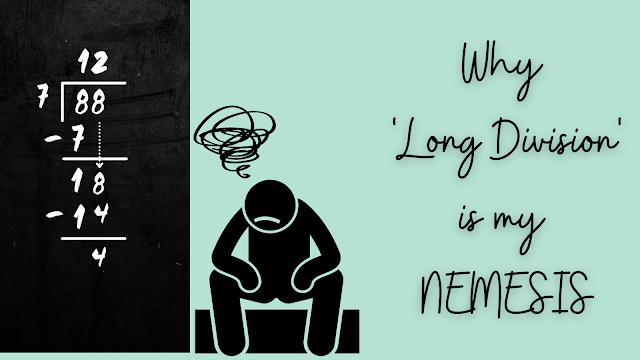Why 'long division' is my nemesis and why teachers should ditch it too!
I detest long division. I almost never take a stance of hatred on anything in life, but long division is the exception. I passionately hate long division. I dream of eliminating it from the primary math curriculum because I cannot find a single reason for any child to learn it.
Why?
“I use ‘Long Division’ all the time!”. SAID NOBODY, EVER.
For the past 8 years I have been randomly asking people “Have you used long division ever in your life?” or “Can you think of one time you have used long division outside of a classroom?”. All of the people I have ever asked have replied ‘No’.
Why isn’t it very useful?
We live in the age of automatic computation
Let me first acknowledge that long division was a fantastic algorithm for a time when we needed it - before the digital age. It is a step-wise, structured procedure to enable people to compute i.e. divide numbers with a good level of accuracy. ‘Computation’ is one small part of mathematics, and in general mathematical problem-solving.
Here is a general mathematical problem solving process in a nutshell (see Conrad Wolfram’s TED talk here for a fantastic, wholesome version of the point I am making):
Define the problem → Translate real world info into math → Compute → Interpret and put it back into real world context
Notice how much critical thinking needs to be developed for mathematical problem solving.
Notice step 3 - Computation. Today, it is the only step that computers can fully do for us, and a million times more efficiently. And yet somehow, in many math classrooms today, we still spend about 90% of our time teaching ‘computation’! Teaching ‘Long Division’ is basically us trying to teach students how to be a very inefficient computer.
It does not support conceptual understanding
Sometimes people counter my ‘long division’ rants with the argument that it builds their mental math ability. The thing is, it really doesn’t. In fact it does the opposite - worsens it. How?
None of the numbers used in the first step of the procedure represent their actual value!
The 8 is really an 80, but the teacher will say ‘look at the first digit, it is 8’. Then, we say ‘7 times 1 is 7, and subtract that from 8’. But really what we are doing is ‘7 times 10 is 70 and subtracting that from 80’!
So this process really doesn’t help students build their ability to divide mentally/ estimate/ generalize the process. And worse, the long convoluted process often leads to ‘einstellung’ (which is a fascinating effect that you must read about anyway). Einstellung is the effect of an overly rehearsed process on an individuals thinking. Their approach becomes so mechanical, it inhibits their ability to approach a problem in more efficient (and often simpler) ways.
It is tedious and inefficient
I believe it is time to stop teaching long division and replace it with more efficient division strategies. Strategies that teach students to arrive at meaningful estimates when presented with a division challenge. Strategies that teach students to break up numbers to manipulate them more effectively.
For example, 37.1 ÷ 19. Here, instead of jumping into long division, students should be taught to round 19 to a more friendly number... 20 to be able to estimate more easily. And then use that to estimate that since 37.1 is slightly less than 40, the rough answer will be slightly less than 2. (This is a whole other blog). Instead I have seen too many students fall victim to 'einstellung' and jump into procedural long division without using any number sense to solve their problem.
And for all the situations where we need to divide with 3 decimal point accuracy, we can take our phones out of out pockets.
Now you might say, what about that one time you are stranded in a place with no cell phone, no other technology, no internet and you really really need to divide a very big number, with high accuracy? Sure, in this situation ‘long division’ wins. For all of the other millions of situations we need to use well trained brains for estimation or the devices at our fingertips for accurate calculations. Not, 'long division'.
So, can we please ditch ‘Long Division’?





Yes please! High time we do.
ReplyDeleteThis is great Radhika, it is a time that we acknowledge and bring the changes in the education system to make it more practical and result oriented.
ReplyDeleteThank you! Working on it :)
ReplyDelete